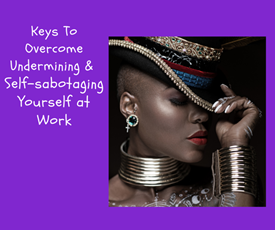April 21, 2022
The habit of self-sabotaging is hard to break. So, the best thing you can do is to try to identify what’s triggering your actions.
To break the cycle of self-sabotage, you first need to know what’s triggering your actions. For example, are you emptying the office of all its candy when you’re stressed out? Do you hole yourself up in a corner? Playing video games on your phone rather than do work when you feel overwhelmed? Though it may be difficult at first, and this is why mindfulness can be so helpful. Try to observe your behavior as an outside observer would. What are the signs that a self-sabotaging action is about to happen?

It can be difficult to break the cycle of self-sabotage when you don’t recognize it. Though it may be difficult at first (and this is why mindfulness can be so helpful), try to observe your behavior as an outside observer would. What are the signs that a self-sabotaging action is about to happen? Is there a pattern? If you see one, what is it that triggers the behavior? What happens when you feel yourself starting to self-sabotage? What are you thinking or feeling at that moment?
This may be hard to do on your own, so consider keeping a journal. Write down what happened right before you felt yourself self-sabotaging yourself. Keep doing this until you recognize a pattern. You can also ask others to help you notice patterns in your behavior.
If you want to make change and break free of the cycle of self-sabotage, once you’ve identified the patterns of self-sabotaging behaviors and thoughts, you need to figure out how to interrupt them. There are many ways to do this.
Find Out: Unveiling the #1 Career Regret and How to Fix It Now
Sometimes the best way to stop sabotaging yourself is to actually fail at something.
While failure can be a hard pill to swallow, it is also directly linked to achievement. It is well-established that failure is an integral part of the learning process and a key ingredient in success. In fact, one study found that people who experienced greater failure during childhood showed higher levels of curiosity and creativity as adults.
If you’re afraid of failing, remember that there’s almost always another chance to succeed. When he was asked about what he would do if he discovered his life’s work was a failure, Thomas Edison replied with this gem: “I would go right on trying until I succeeded.”
Edison had a reputation as an optimistic man. He faced a lot of failures in his career, but ultimately created many important devices that have changed the way we live today. His recipe for success? “Many of life’s failures are people who did not realize how close they were to success when they gave up,” he said.
Just being aware of what’s triggering your self-sabotage is a huge step in breaking the habit.
Awareness of the problem is the first step to finding a solution, so just being aware of what’s triggering your self-sabotage is a huge step in breaking the habit.
To do this, she suggests getting out a pen and paper and writing down every time your self-sabotaging behavior rears its ugly head. Keep track for a week or two. What are you feeling? Who were you interacting with when it happened? What was your thought process?
Look at patterns. Say you notice that every time you’re stressed about work and have an important deadline or presentation coming up, you go out for dinner with friends. You eat too much and then feel guilty about it afterwards. This patternfeeling overwhelmed leading to overeating followed by guiltis obviously not working for you. So, think through how else to manage those feelings in the future, like going on a walk or meditating instead of eating recommends.
Another huge step toward stopping your sabotaging ways is to recognize and acknowledge when you’re doing it.
Acknowledge that you’re self-sabotaging. The first, and most important, step to stopping something is recognizing when and how it’s happening. When you find yourself in one of these situations, take a deep breath.

- Say out loud: “I’m self-sabotaging.”
- Say it in your head: “I am self-sabotaging.”
- Write it down: I am self-sabotaging.
- Tell someone else. Most likely this situation involves a coworker or boss who is aware of the problem anyway. Make an effort to get their perspective on what has been happening between you two, and how they think things should be handled moving forward.
- Thank yourself for acknowledging that you are self-sabotaging. Self-awareness will put you well on the path toward breaking whatever pattern has been holding you back from being successful at work!
Once you’re aware of what’s triggering your self-sabotage, you can get rid of those triggers or at least find healthier ways to address them.
It’s important to note that these are not necessarily things that you consciously think about or even realize are happening. They can be deeply ingrained patterns of behavior and thought, but once you’re aware of what’s triggering your self-sabotage, you can get rid of those triggers or at least find healthier ways to address them. These could be things like bad influences getting in the way of you finishing a project, social media habits that don’t serve you well, or toxic people who make you feel less than you are.
In some cases, it might mean finding healthier alternatives for coping with difficult situationssuch as not using alcohol or drugs to help yourself relax when work is stressfulor changing your mindset by making a conscious decision to be more positive.
It could also mean taking care of your health so that it doesn’t get in the way of your success. Whatever it is that’s causing negative self-talk and patterned behavior that leads to self-sabotage, make a plan for how to stop doing it and how long it will take until the change becomes routine.
Now that you know what triggers your self-sabotage, make a plan for how you’re going to deal with these situations when they arise.

It’s time to stop sabotaging yourself at work. The side effects of self-sabotage can be debilitating, and it feels like you’re in unproductive headspace all day every day.
If you find yourself sabotaging yourself repeatedly because you’re afraid to be successful, ask if it’s really worth it in the long run. Do you really want to stay stuck in the same place and go nowhere? If so, then keep doing what you’re doing. But if not, then use your fear as motivation to make positive changes.
Working on your self-sabotage means developing a plan for how you’re going to deal with these situations when they arise, so that you don’t get stuck in a cycle of constantly doing things that sabotage your goals. Over the past decade, I’ve learned a lot about how my mind works and what triggers me to sabotage myself.
If you’ve been trusting someone with negative things like fear of failure or fear of success, stop!
In today’s workplace, it’s crucial to have a sounding board. A person or even better, people who you can trust and who trust you to help each other out at work. For example, I had a colleague who would bounce ideas off me when she needed some perspective on her projects. She knew that my job was different from hers but that I was connected enough to her work to offer meaningful advice. In return, she was there for me when I needed someone neutral to talk with about problems with my boss or strategies for moving forward on my projects. Having this kind of relationship helped us both be more successful in our jobs and happier in the workplace.
But it’s essential who you choose as your sounding board you need someone who will give you honest feedback without criticism; someone who sees your work not as an extension of their own but as something completely different; someone who will be completely dedicated and focused on helping you move forward, not finding fault in your efforts or distracting you with their own problems
If it’s not clear-cut which person is best suited for this role then ask yourself these questions: If a problem arises (and inevitably they will), can I turn to them? Are they trustworthy? Do they have their own agenda and do they align with mine? Do they want the best for me and my career? And am I able to be completely honest and open with them?
After all, if we’re sabotaging ourselves because we’re getting bad advice from people, we shouldn’t be trusting anyway then why should we care what happens?
Break this pattern.
You can break this pattern. Decide whether you will fall into the same habits or change your workplace self-sabotage.
You decide whether you will seek help from mindset coach, and then make those appointments.

You choose to start taking steps to break that cycle of self-doubt and self-sabotage.
- Learn to forgive yourself.
- Focus on the positive.
- Develop a deeper understanding of yourself.
- Develop a deeper understanding of others.
- Practice self-compassion and self-kindness every day.
- Set boundaries with others and learn to say no more often than you say yes
- Simplify your life, your schedule, your commitments, and learn to focus on what is most important in your life right now instead of trying to do everything all at once
- Ask for help when you need it and don’t be afraid to share your dreams with others who can support you even if they don’t fully understand why you want to achieve those things
- Don’t give up on yourself or your dreams just because progress isn’t as fast or as easy as you would like it to be; keep working toward your goals no matter what happens in life because nothing is impossible for someone who believes in themselves and their own abilities
- Surround yourself with people who believe in you, who encourage you, and who support you in your quest for personal growth.
It’s not easy, but it is possible. And it’s worth it if you want to feel more confident at work and find lasting career success.

Twanna Carter Professional & Personal Coaching helps high achieving professional women who are anxious about transitioning into a new career, have absolute confidence and belief in their own abilities, so they can communicate their unique value, honor their true purpose and boldly pursue their dream career.
Schedule a 30-minute Career Solution Call here.

Read Next
- Why Career Uncertainty Silently Shrinks Earning Power of Black Women
- Why Black Women Fail at Career Pivots. Barriers and Pathways to Success
- 7 Powerful Strategies to Brand & Thrive After a Layoff
- Personal Branding for Black Women Who Are Invisible. A Transformative Guide
- The Worker Bee Trap for Black Women Executives. How Over-performance Keeps Us Invisible in Corporate America
+ show Comments
- Hide Comments
add a comment